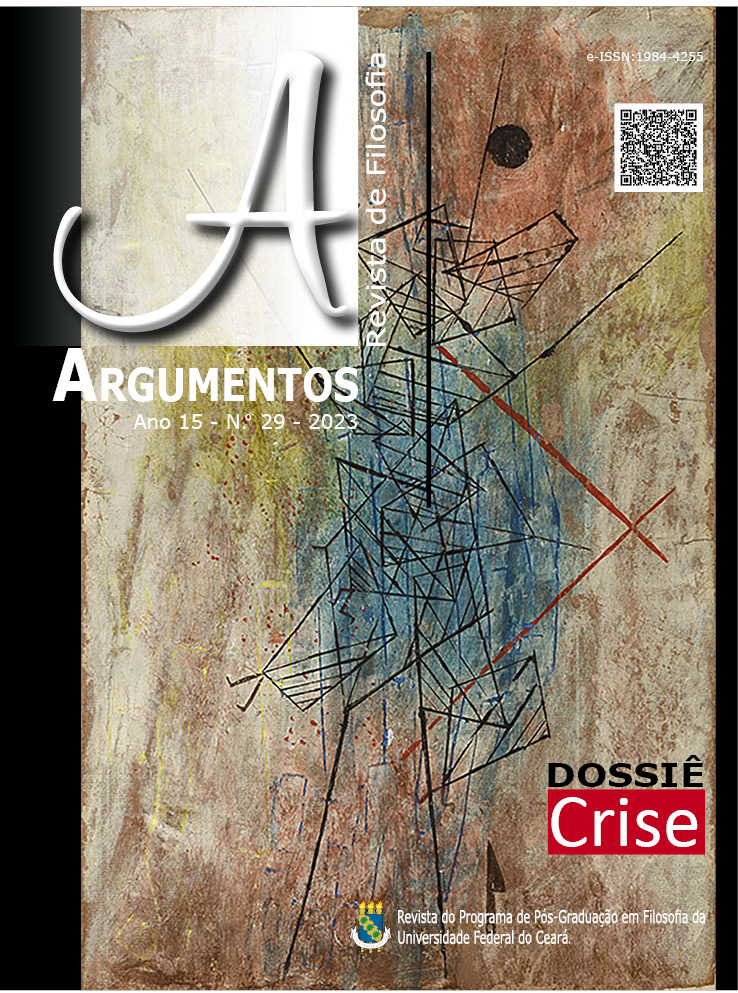Urstiftung und Krisis: Anmerkungen zu zwei Grundbegriffen der Phänomenologie
DOI:
https://doi.org/10.36517/Argumentos.29.3Keywords:
Phenomenology. Edmund Husserl. Martin Heidegger. Crisis. Life-World.Abstract
Utilizing a critical approach, this article aims to interpret two of the most important concepts of Husserl’s late work: crisis (Krisis) and original foundation (Urstiftung). Special attention is paid to the metaphorological background as well to the unintended implications of Husserl’s use of both concepts.
References
BLUMENBERG, H. Beschreibung des Menschen. Hg. v. Manfred Sommer, Frankfurt a.M.: Suhrkamp, 2006.
BLUMENBERG, H. Die ontologische Distanz. Eine Untersuchung über die Krisis der philosophischen Grundlagen der Neuzeit. Hg. v. Nicola Zambon, Berlin, 2022.
BLUMENBERG, H. Die Sorge geht über den Fluß. Frankfurt a.M.: Suhrkamp, 1987.
BLUMENBERG, H. Lebenszeit und Weltzeit. Frankfurt a.M.: Suhrkamp, 1986.
BLUMENBERG, H. Theorie der Lebenswelt. Hg. v. Manfred Sommer, Frankfurt a.M. : Suhrkamp, 2010.
HUSSERL, E. Die Krisis der europäischen Wissenschaften und die transzendentale Phänomenologie. Eine Einleitung in die phänomenologische Philosophie (Husserliana, Bd. VI), hg. v. Walter Biemel. Den Haag,, 1976.
MERKER, B. Selbsttäuschung und Selbsterkenntnis: Zu Heideggers Transformation der Phänomenologie Husserls. Frankfurt a.M. : Suhrkamp, 1988.
MERKER, B. „Konversion statt Reflexion. Eine Grundfigur der Philosophie Martin Heideggers“, in: Martin Heidegger: Innen- und Außenansichten, hg. v. Forum für Philosophie. Bad Homburg, Frankfurt a.M., 1989, pp. 215-243.
SOMMER, M. Lebenswelt und Zeitbewußtsein. Frankfurt a.M.: Suhrkamp, 1988.
VOEGLIN, E. „Brief an Alfred Schütz über Edmund Husserl“. In: ders: Anamnesis. Zur Theorie der Geschichte und Politik, Freiburg i.B./München 2005.
WELTER, R. Der Begriff der Lebenswelt. Theorien vortheoretischer Erfahrungswelt. München, 1986.
ZAMBON, N. „Nachwort“. In: BLUMENERG, H. Die ontologische Distanz. Eine Untersuchung über die Krisis der philosophischen Grundlagen der Neuzeit. Hg. v. Nicola Zambon, Berlin, 2022. pp. 349-376.
Downloads
Published
Issue
Section
License
Argumentos magazine is licensed under an International Creative Commons Attribution License.
The Magazine uses CC BY inclusion
1) The authors retain the copyright granted to the magazine or the right to initial publication, with the work regularly licensed under the Creative Commons Attribution, which allows the sharing of the work with acknowledgment of authorship and initial publication in this magazine.
2) The authors are authorized to contract additional applicable contracts, for non-exclusive distribution of the version of the work published in this journal (for example, publication in the institutional repository or as a chapter of the book), recognition of authorship and initial publication in this journal.
3) Authors are authorized and encourage to publish and distribute their work online (for example, in institutional repositories or on their personal pages) at any time before or during the editorial process, as they can generate productive changes, as well as increase the impact and reference of published work.




.jpg)










._._3.png)
1.jpg)
._._._.png)
